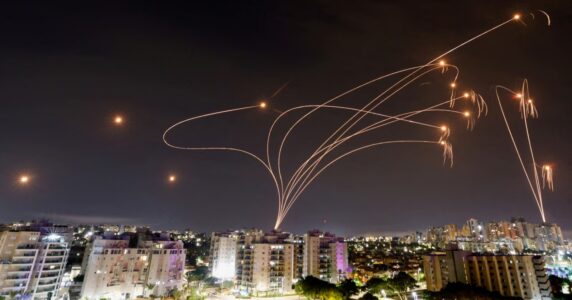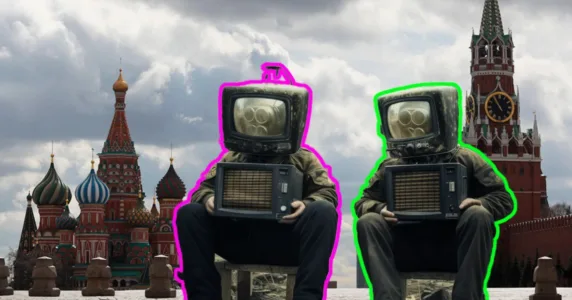Navigation and useful materials
The first large-scale defeat of the Russian army in Kharkiv region naturally led to the defeats of Russian propaganda. Even propagandist Solovyov was forced to say: “there is a thought that we will lose the information war…”
As a result, Russian television kept silence for a long time regarding the defeats of its army, and only after the liberation of the territory, they began to talk about the “most difficult week.” The telegram channels of the military propagandists kept the information front secure until the real one fell.
Then their thoughts broke out as well. Team Russian-fascist propaganda got very nervous and began to share their souls: it turns out that the Russians usually do not want war, moreover — condemn the actions of Russia. A large number of the military and riot police, allegedly, quit immediately after its beginning.
Having reached the climax, the propagandists began to comfort each other, saying, “no panic” and now, when “the homeland is in danger,” it is time to definitely…start fighting seriously.
Margarita Simonyan urged Russia not to collapse, as it had already done in 1917 and 1991, whereas Kadyrov tried to calm “the most violent and sceptical commentators” with explanations that “we are not retreating anywhere.”
At the same time, a number of commentators on the NTV talk show allowed themselves to state that it was impossible to defeat Ukraine, while denying the existence of Ukrainians. And even if “residents of Odesa are not awaiting the Russians,” there is no faith in those who claim that Russia should “go to the very end” because the prediction “Ukraine will fall in 3 days” turned out to be false.
“Poor” Attack on Kherson
However, the first days of September began with ridiculing the “unsuccessful” Ukrainian offensive on Kherson, with the propagandists calling it nothing.
Telegram channel “Older than Edda”: “By the way, both the Ukrainian media and their Western patrons keep shyly silent about the big counterattack. Given that, I am interested in reading our domestic theorists who predicted the collapse of the Russian army and were inspired by Zaluzhnyi’s military talent.”
The key messages that Russian propaganda tried to promote in the information field were about “mountains of corpses,” about Zelenskyy, who “sends people to death,” and about hospitals, which, according to “Western journalists,” were full of the wounded.
Attempts to provoke hatred of the Ukrainian authorities in the performance of the Russian “war correspondent” Poddubny looked like this: “What is happening in the Kherson direction, Arestovych called ‘a small and nice offensive of the Armed Forces of Ukraine’. Think about it, the guys are killed by the artillery, the regime sent the personnel to be slaughtered in the Kherson steppes, and the fool talks about a ‘nice offensive’. Won’t he be beaten up by fellow soldiers? On seconds thought, he will not, these people have no self-respect.”
On September 2, Shoigu had the possibility to speak at the conference call. The Russian Defence Minister said that the enemy offensive was an illusion: “I would like to emphasize that this action was planned by the Zelenskyy office with the sole purpose of creating an illusion in Western curators of the ability of the Armed Forces to conduct an offensive.”
At the same time, the propaganda decided to invent Ukraine’s offensive against Zaporizhzhia NPP.
The 100% fake Ukrainian landing at the ZNPP was launched in parallel with the visit there of the IAEA delegation so that it would get into the world media. Perhaps the Russians wanted Ukraine’s planned offensive to be associated with the “Ukrainian shelling” of the ZNPP.
However, some disturbing momentys were already present in the posts of Nazi propagandists, who counted how many Ukrainians they would have to kill to capture Ukraine.
As we can see, the “Russian wizards” still do not understand how to defeat Ukrainians who are waging a fair war with the invader, but for some reason hope for a new “super special operation” that will break the morale of Ukrainians. One could advise them to look at footage from the Revolution of Dignity, but they will hardly get anything.
Yurii Podoliaka, a propagandist, managed to make an analysis, mentioning the ban on journalists working at the front during the offensive: “Zelenskyy, forbidding to show half the truth, shot himself in the leg. But he couldn’t do otherwise. Had he not done this, there would have been panic in the Ukrainian rear, and the truth would have emerged about what the defeat in the Kherson direction, how much equipment, how many people, resources were lost for the sake of some insignificant achievements.”
At the same time, the propaganda carried out another attempt to drive a wedge between the army and the authorities.
“Zelenskyy is now dissatisfied with the offensive, demanding to throw additional reserves to attack. This is already causing another wave of conflicts between the military bloc and the political bloc. Zaluzhnyi is back at the “forefront.” Soon, “conflict” may emerge in the public plane. The Bankova fears it very much,” wrote the Legitimniy Telegram channel.
It also turned out that Ukrainians liberated Snake Island somehow in the wrong way.
“No Panic,” but There Are Nuance….
However, a part of Russian propagandists began to make critical remarks: “…But we do not have enough intelligence systems, and this allows the Armed Forces, although they are very much inferior to us in firepower, to regularly strike at vulnerable places — which, in turn, is facilitated by serious air and space reconnaissance by NATO,” the “Older than Edda” Telegram channel posted.
“…We were near Soledar for 2 days… The amount of shelling of our positions has increased noticeably. The Armed Forces have overcome the munition famine in this area of the front, and they can shell an isolated target with 155 mm cannons. Besides, I would like to note counter-battery fire. The new shift brought with it radars, which seriously gets on the nerves of our artillery,” was written in the group “Witnesses of Bayraktar.”
The basis for the Ukrainian meme was the post in “Veteran’s Notes”:
“There is no panic. Mostly mobilized soldiers were in Balakliya. Reserves are now going to Balakliya. Cannon and rocket artillery are in operation. Aviation is active. There is no deep breakthrough. The situation is more or less as with the Nazi counter-offensive in the Kherson direction.”
Other, more frank thoughts began to emerge because tension from the Ukrainian offensive. Thus, militant Khodakovsky wanted to corroborate his revolutionary views on the relativity of the state borders of countries: “Now the question is: why did none of those who condemn Russia for the decision [to launch a full-scale invasion] after unsuccessful attempts to seek peace from Ukraine did not and do not condemn Ukraine for its choice?”
He also reproached the Russians for the lack of support: “I would especially like to address the Russians who are ready to judge their country, but do not want to judge its opponent? There is no reason to be surprised that such an opinion is not considered, and they themselves are increasingly turning into foreign agents in their own country.”
The liberation of Balakliya, Kupiansk, and Izium, which took place one after another, finally shook the emotional state of the occupation’s propaganda service.
At the same time, war correspondent Sladkov involuntarily left an interesting testimony to the level of professionalism and morality in the Russian army, which, as you know, uses mobilized residents of Donbas as cannon fodder: “And I have personally recently heard a senior officer assigning a task to a junior officer: ‘You will recruit an assault group out of reservists. There are scientists, almost all of them have PhD. Don’t be afraid, there are enough crazy among them too, they attack.”
“Heavy fighting in the Kharkiv direction. The Armed Forces were gathering forces to strike Balakliya, Izium, and Kupiansk for more than a month, at least, we reporters knew about it. I am sure that this data had been reported even earlier to the GS. … I really want to hope that our military superiors have something to answer in this direction,” wrote war correspondent Rudenko.
After the defeat, a discussion broke out among the propagandists – whether ordinary war correspondents from the fields, as Simonyan said, who fight with a microphone, have the right to criticize the “superior” leadership.
Meanwhile, in the days of defeats and chaotic retreat in the Kharkiv region, the public could hear Konoshenkov’s monotonous speeches about high-precision strikes on nationalists and reinforcements coming to difficult areas on television. And later, he started mentioning “regrouping of Russian troops in the area of Balakliya and Izium” — to reinforce the Donetsk direction.
Even Putin himself decided to sing along to the state propaganda, saying on September 7: “We have not lost anything. And we will not lose anything.” It appears that more than 50,000 murdered Russians are “nothing,” as well as relations with Ukrainians spoiled for decades — nothing…
With its offensive, Ukraine also spoiled Kremlin’s fairly large PR festive day with the opening of the monument at Savur-Mohyla, which the occupiers organized on September 8 with television coverage. On this occasion, Russian high-profile occupiers visited a concert in Donetsk oblast: curator in Donbas Sergey Kiriyenko and Deputy Defence Minister of the Russian Federation Timur Ivanov.
On the same day, Channel One aired a hypocritical story about “happy newcomers” from Mariupol, who were given flats in three surviving five-story buildings in the city destroyed by the Russians, and who commented that “construction usually took longer in Ukraine.”
While the propaganda Telegram channels were worried about defeat, their patriotic audience was outraged by the lack of this topic on TV.
Increasingly, Russians, according to the propagandists themselves, began to subscribe to Ukrainian telegram channels to receive alternative information. Propagandist Markov even had to explain why television in Russia was doing the right thing by keeping silent about failures at the front.
A firework in Moscow on the City Day on September 10 put an end to this propaganda cacophony; given the news, the firework looked more like a greeting for the first military victories of Ukrainian democracy in the war against Kremlin Rashism.
Of not having thought of cancelling the fireworks because of their inappropriateness. In the end, subsequent celebrations, in particular, the Day of Voronezh, as well as the Day of Rostov-on-Don on September 17, were cancelled.
“I don’t think it’s necessary to explain why: too much has been said on this topic in recent days,” commented Gusev, governor of the Voronezh region. The celebration of the City Day in the usual format was also cancelled in Rossosh, Voronezh region, and in Sovetsk, Kaliningrad, due to the “tense situation in the war zone and the death of fellow countrymen.”
Meanwhile, in the telegram, the propagandists tried to calm each other. The “Older than Edda” group urged: “Stop running in circles. Why now is not the time to panic. The battles for Balakliya cause a hysterical reaction among fellow citizens. “Everything is lost, now the Armed Forces will victoriously attack Voronezh!” some shout. “You don’t understand, the enemy has colossal losses, the enemy is stopped!” the others scream.
In the end, the propagandists calmed themselves that defeat would help Russia gather its strength. Once again, people began talking that this was no longer a special operation, but a real war. And, of course, against the West.
A traditional consolation for Russian vanity was the denial of the decisive role of Ukrainians, who are not easy to defeat because they are “resourceful and energetic, and their teachers are exclusively professional.”
Because how it can be explained without these imaginary “teachers” that Ukraine (which does not exist) with Ukrainians (who do not exist) defeat “Putin’s great Russia.” It’s just that Russian Nazism, which does exist, is not able to recognize that Ukrainians have the same rights to love their country as do Russians. And this is a clue to who really needs denazification and which country is “land of slaves, land of masters” that does not know how to build equal relations, but only lives according to the formula “slave and master.”
“Holy War with the West” and the Great “What for”
The propagandists now say it is not only about Ukraine, it is about the threat of Russia’s defeat. Therefore, there is a need to mobilize.
“Do we want Russia to win this great war with the united West, in particular, on the Ukrainian bridgehead? If we do, then the question is, are we willing to pay such a price for this victory as our grandfathers and great-grandfathers did? asked Alexander Kazakov, Russian propagandist and activist of the so-called “DPR.” Hearing the host’s answer: “no!” he continued: “Otherwise, there will be no victory. … We are at war with the united West, the leaders of the Western world publicly and officially declared it.”
Reproaches began to be heard against the Russians who did not want to participate in the occupation: “if we do not defeat them, Russia simply will cease to exist.”
Propagandist Prilepin added to the unwillingness of the Russian military to fight: “There is information now about too serious a number of servicemen in the system of the Ministry of Defence, who started quitting after February 24… All these six months we knew about it, but we were silent so as not to upset anyone. In fact, unfortunately, there was similar news about riot police: now, the situation in general seems to have stabilized because at the beginning of the special operation, entire detachments were quitting in several cities.
The breaching of the “information front” even got on TV. On September 9, in a talk show on NTV, where Boris Nadezhdin asked the propagandist how long this imperialist war would take, and having received an answer “a long time,” he clarified whether this means that his 10-year-old son will still have time to fight.
To interrupt the Ukrainian counteroffensive agenda, Russian television, in particular Dmitry Kiselev and Olga Skabeeva in their programs, joyfully reported on the destruction of the Ukrainian civilian energy system — CHP, dams in Kryvyi Rih, and that Ukrainians were deprived of electricity, and this was only the beginning. Such a primitive act of terror and powerless “revenge” for military defeat seems to be posed by putin’s regime as valour.
The President of Ukraine aptly answered the question of the Russian propagandist Simonyan “What’s with the light, neighbours?” catching the mood of most Ukrainians: “Read my lips: Without gas or without you? Without you. Without light or without you? Without you. …And history will put everything in its place. We will be with gas, light, water, and food… and WITHOUT you!”
At the same time, propagandists, saving themselves, are trying to launch processes of deeper fascization of Russia to destroy Ukrainians:
“…Stop calling some kind of “regime” enemies. There are thousands, hundreds of thousands of enemies. Murderers, rapists. Scum. We must use our troops, our legions. Each of us must contribute. Or else we are worthless. But we know how to win after losses. We know how to rise. And we will rise! And it is the duty of each of us to help the Motherland win!” Simonyan reposted in her Telegram on September 13th.
Given the results of the defeats of the Russian army in the Kharkiv region, the following trends in Russian propaganda can be identified:
- the propagandists apparently “look like complete fools” because repeated statements about the invincible power of Russian weapons and the “inability” of Ukrainians to attack, as well as the mantra of “there is no panic” — turned out to be untrue;
- propagandists were overwhelmed by emotions, and they started allowing themselves more critical and frank comments;
- on TV, the Russians continued to lie that everything was under control;
- propagandists raised the level of emotions to that of an existential war and a “decisive battle with the West,” trying to involve as many Russians as possible in a reckless war with Ukraine;
- for the first time because of the war, the celebration of city days in several major administrative centres of Russia was cancelled;
- for the first time, Russian television began to widely cover and enjoy strikes on the civilian infrastructure of Ukraine;
- feeling anxious, the Russians began to look for more information in alternative sources to the Putin’s “federal grid”;
- regime propagandists complained about successful and large-scale work against them in the field of information operations, in particular, comments on the Internet, pro-Ukrainian Russian-speaking bloggers, etc.;
- a discussion began on the topic: do war correspondents have the right to write the truth from the front line, unpleasant for the “superiors”?
“War correspondent” Kots wrote: “With a system in which the superiors dislike bad news, and subordinates dislike upsetting the superiors, we must do something. Perhaps awarding for bad news is the answer…”
That’s right, only, there’s bad news. There is a Soviet funny story about a plumber in an administrative building saying:” the entire system must be changed…”
Centre for Strategic Communication and Information Security
A media version of the article can be found on the website of the UP
If you have found a spelling error, please, notify us by selecting that text and pressing Ctrl+Enter.



